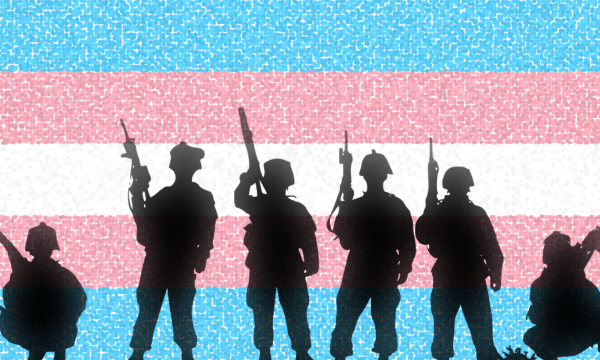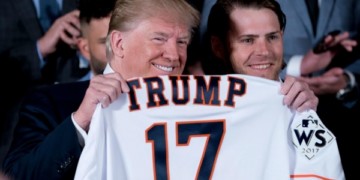Trans persons should be allowed to serve, same as anyone else
Thorne MelcherBlockedUnblockFollowFollowingDec 3

On November 23, the Trump administration asked the Supreme Court to hear the case of the proposed ban on transgender people serving in the U.S. military. Though initially announced last year, district courts nationwide have thus far blocked its implementation. Trump now seeks to undo that block as expediently as possible by requesting the Supreme Court to intervene before regional appeals courts can issue their rulings. As a trans woman, I am deeply worried about the consequences if he succeeds—both for the trans soldiers themselves and for the transgender community as a whole.
Trans service members, of course, will feel this hardest. Trans people serve in the military at twice the rate of the general population. Their existence — even without these challenges — is already a precarious and often traumatic one, with trans service members enduring “wide-ranging experiences of discrimination, harassment, and physical and sexual assault,” as one study notes. That struggle does not end with their military service — more than one in five trans veterans experience homelessness. Add to that the lack of medical care, PTSD, and all the other difficulties veterans face, and the result is a combustible mix that, when you layer on the various ways in which transphobia manifests itself (for example, other groups aren’t forced to endure their own commander in chief trying to fast-track their exclusion), is especially awful for trans service members.
Worse still, Trump’s proposals don’t specify whether being transgender is grounds for an honorable or dishonorable discharge. Many in the military are spending this holiday season worried about whether they will still be eligible for veteran’s benefits. Based on Trump’s words, it’s perhaps not too hard to tell what he would personally prefer. From a Washington Post write-up:
Trump’s message that “the United States Government will not accept or allow transgender individuals to serve in any capacity in the U.S. Military” surprised military leaders and members of Congress. Trump said he was “doing the military a great favor” by “coming out and just saying it.”
While I am not in the military, I can’t help but see this as merely the latest in a series of actions the Trump administration has taken against the transgender community. In October, news broke that the Trump administration wants to define transgender people out of legal existence, prompting staunch criticism from everyone from psychiatrists to massive corporations. The effects of this would be wide-reaching, from making it easier to legally discriminate against trans people to giving insurance companies a basis for denying medical care such as hormones and surgery — the latter of which is nearly impossible for most to pay out-of-pocket.
All of this coincides with ongoing attempts to ban transgender people from using the appropriate bathroom, despite the fact that there is no link between trans bathroom use and bathroom safety. How can these actions be interpreted as anything but the attempt to push transgender people out of public life?
Each of these things, on their own, is horrifying to a trans person. For example, earlier on in my transition, I often felt terrified to use either bathroom. How many trans service members must there be who actively worry whether their identities will provoke the sitting administration to order their humiliating dismissal? At this point, what trans service member wouldn’t?
These days, opposition to our social integration can be manufactured out of thin air. Take the recent New York Times opinion piece about one trans person’s unhappiness. Standard stuff for a person to be unhappy, isn’t it? Yet a narrative was formed. One person’s account was extrapolated to an entire community. Right-wing pundits weaponize instances like this by treating them as if they are typical experiences. Of course, the reason why that happens is obvious: if the “typical experience” is one of abiding unhappiness, it can justify the exclusion that trans opponents are looking for. That is not to say the author’s experiences are invalid, yet what tends to happen is anti-trans elements use whatever they can against us.
This Supreme Court hearing is, then, one of a series of battles; one that casts trans service members into the role of the canary in the coal mine. Should they be barred from service, this would upend their lives, derail their careers, and make their futures uncertain. These are people who, in many cases, joined the military because they lacked other viable paths in society. Disparaging and ultimately banishing them would send an alarming message to trans people moving forward.
Such a ruling would set a difficult-to-overturn precedent by explicitly legalizing a drastic form of discrimination at one of the largest employers in the world. Those who wants to deny transgender people employment could well be provided with a legal basis for doing so. Given trans unemployment is three times the national average and, last year alone, more than one in four transgender people faced serious workplace discrimination, this will make an already bad problem even worse.
This military ban is an overreach of Trump’s authority seeking to overturn the wishes of so many groups — trans people, military leaders, judges, doctors, psychiatrists, businesses — in order to advance an exclusionary agenda. Given Trump’s lack of empirical evidence for this ban coupled with the fact that the ruling would overturn the work of so many lower courts, such an action would be more a testament to the loyalty of the conservative justices than to justice itself.
The fact that Justice Kavanaugh is in a prime position for shaping the fate of the transgender community is especially frustrating given that we are constantly faced with baseless accusations of constituting a danger to others. Meanwhile, Dr. Ford’s testimony is waved away.
The Trump administration must not ban trans service members. The only justification would be that we are less than other Americans, which is not true, and so is no justification at all.

























Connect with us